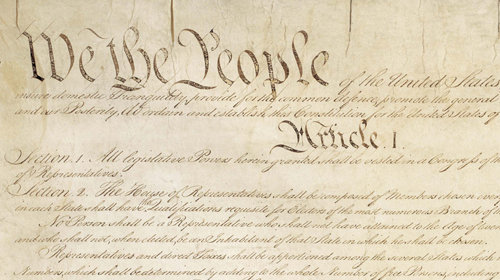
September 17 is Constitution Day, and here’s a suggestion for how you might celebrate.
Gather some patriots -- cakes and ale and three-cornered hats optional -- and as a party game, see if your guests can answer some basic questions about the Constitution from a 1997 poll commissioned by the National Constitution Center. For example,
What are the three branches of government?
How many senators are there?
What are the four rights guaranteed by the First Amendment?
Does the Constitution establish the United States as a Christian nation?
Do these questions seem easy to you, readers of the ACLU Blog of Rights?
In this first comprehensive survey of constitutional knowledge, it turned out that although most Americans (over three-quarters) say that they are very proud of our Constitution, only five percent could accurately answer ten basic questions, like those above, about its contents. 62 percent couldn’t name the three branches of the federal government (Legislature, Executive, Judiciary) and one third couldn’t name even one branch; over half did not know the number of Senators (100); only six percent could name “the four rights” guaranteed by the First Amendment (free exercise of religion, freedom of speech, freedom of the press, and freedom of peaceable assembly and the right to petition for redress of grievances – or is that really five or even six rights?) and one quarter couldn’t name any; one sixth incorrectly believed that the Constitution established the United States as a Christian nation.
Why do Americans know so little about the Constitution they claim to revere? I’ll offer two explanations. First, the fact that the Constitution was intentionally made so difficult to amend (in Article V, to answer another question) means that we don’t tend to actively engage with its provisions because we don’t get to vote on them. The Constitution has been amended only 27 times since 1787. This stability is a boon for rights, which are protected againsttrends, panic, ormajority self-interest. But the down side of placing the Constitution on a pedestal, out of easy reach, is that people don’t feel a real sense of ownership of this documenteven though it is supposedlyby and for “We, the People.”
A second explanation for widespread ignorance about the Constitution would be that the schools are not doing an effective job of teaching it. In 2004, Congress sought to improve this situation by declaring that every September 17, on the anniversary of the signing of the Constitution, each school that accepts federal funds must offer educational programming about the Constitution.
The Constitution Center and various other providers offer Constitution Day curricular suggestions for exploring constitutional history and our founding documents, a very important enterprise. But I’m thinking that the ACLU, through its nation-wide affiliates, is ideally situated to offer students some more contemporary and maybe more engaging lessons about what the Constitution means to us and to them today. Who better to explain the real significance of the Constitution than the folks who defend it?
Stay tuned while the ACLU National Communications Department explores this new frontier, and please do share any of your own ideas or experiences. And if you want to give the Constitution a birthday present, join or rededicate yourself to supporting its defenders.
Learn more about your rights: Sign up for breaking news alerts, follow us on Twitter, and like us on Facebook.



